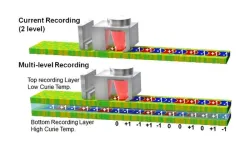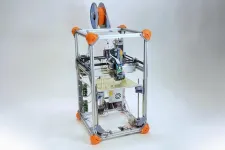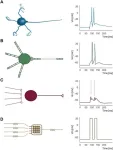(Press-News.org) Half of all patients discharged from hospital after a heart attack are treated with beta-blockers unnecessarily. This is according to a new study published in the New England Journal of Medicine. "I am convinced that this will influence future practice", says Tomas Jernberg, Professor at Karolinska Institutet and lead researcher of the study.
Today, when patients are discharged from hospitals after an acute heart attack, they are regularly treated with beta-blocker drugs such as metoprolol and bisoprolol. Now new research shows that about half of them do not benefit from the treatment and should not receive it at all. These are the patients who have suffered a small heart attack and have retained heart function afterwards. The study will change the way patients are treated in the future, says the lead researcher and last author of the study, Professor Tomas Jernberg from the Department of Clinical Sciences at Karolinska Institutet.
“I am convinced that this will influence future practice. This study has already been mentioned in the European guidelines for cardiac care, so the results are in demand," he says.
The project was led by researchers at Karolinska Institutet, Lund University and Uppsala University. More than 5,000 patients at 45 hospitals in Sweden, Estonia and New Zealand who suffered a small heart attack were randomized to either receive or not receive beta-blockers at discharge.
The study began in September 2017 and patients were followed up until November 2023, by which time 7.9 percent of those receiving beta-blockers had the primary outcome of death or a new heart attack, compared to 8.3 percent of those not receiving beta-blockers. This difference is not statistically significant. Nor was there any difference between the groups in the secondary outcomes.
The result means that, unusually, the drug treatment becomes simpler and cheaper for all parties, says Tomas Jernberg.
“Typically, new research results in the addition of a medication to a patient's regimen. However, this study shows that patients will benefit from taking one fewer drug”.”
But he immediately warns patients not to stop their treatment on their own accord. The current study is only about the effect of starting treatment after a small heart attack, not after a larger one. Nor does it show anything about the effects of stopping treatment. More importantly, stopping medication should always be done in consultation with the treating physician.
“This is for several reasons. There may be other causes, other diagnoses, behind the use of beta-blockers. Then there is the fact that if you are going to stop, you should stop beta-blockers gradually. If you do it too quickly, you can get some heart palpitations and other discomfort. So, it is very important that you talk to your doctor before stopping any heart medication," says Tomas Jernberg.
The research was funded by the Swedish Research Council and the Swedish Heart-Lung Foundation. The researchers report that there are no conflicts of interest.
Facts:
In Sweden, around 20,000 people have a heart attack every year. Half of them have a small heart attack with retained heart function afterward. This means that the heart can still pump out more than 50 percent of the volume in the left chamber of the heart, known as preserved left ventricular systolic function.
The reasons behind the current practice of giving everyone a beta-blocker after a heart attack can be traced back to the 1980s when studies showed unequivocally that it was beneficial. But since then, other cardiovascular treatments have improved, as have diagnostics, so doctors are now detecting many of the heart attacks that were never classified as infarctions before. This, together with the fact that the incidence of heart attacks has steadily declined since the 1980s, means that today's heart attacks are generally smaller and with a higher proportion of people with preserved left ventricular function.
Source: Tomas Jernberg
Publication: "Beta-blockers after Myocardial Infarction and Preserved Ejection Fraction" Troels Yndigegn, Bertil Lindahl, Katarina Mars, Joakim Alfredsson, Jocelyne Benatar, Lisa Brandin, David Erlinge, Ola Hallen, Claes Held, Patrik Hjalmarsson, Pelle Johansson, Patric Karlström, Thomas Kellerth, Toomas Marandi, Annica Ravn-Fischer, Johan Sundström, Ollie Östlund, Robin Hofmann, Tomas Jernberg. New England Journal of Medicine, online April 7, 2024, doi: 10.1056/NEJMoa240147.
END
Unnecessary use of beta-blockers after a heart attack
2024-04-08
ELSE PRESS RELEASES FROM THIS DATE:
The World Mitochondria Society keynote speakers announced: Professor Eric Schon and professor Howy Jacobs
2024-04-08
Save the Date for the 15th World Mitochondria Society Annua Meeting on October 29-31, 2024, at DoubleTree by Hilton Berlin Ku’damm, Berlin, Germany. The WMS is pleased to announce the participation of two distinguished keynote speakers for the Targeting Mitochondria 2024 conference in Berlin this October.
Keynote Speaker of Day 1: Prof. Eric Schon
Professor Eric Schon from Columbia University, USA will deliver a presentation titled "Mitochondria in Alzheimer disease: it's not what you think".
Prof. Schon challenges the conventional understanding ...
AACR: Combination treatment is well-tolerated, shows antitumor effects in KRAS G12C-mutated metastatic colorectal cancer
2024-04-08
ABSTRACT CT013
SAN DIEGO ― Combining the KRAS G12C inhibitor adagrasib with the anti-EGFR antibody cetuximab demonstrated promising anti-tumor effects in patients with KRAS G12C-mutated metastatic colorectal cancer (CRC), according to pooled results from the Phase I/II KRYSTAL-1 trial reported by researchers from The University of Texas MD Anderson Cancer Center.
The findings were presented today in a plenary session at the American Association for Cancer Research (AACR) Annual Meeting 2024 by Scott Kopetz, M.D., Ph.D., professor of Gastrointestinal ...
AACR: PARP1-selective inhibitor demonstrates early efficacy in breast cancers with DNA repair defects
2024-04-08
ABSTRACT CT014
SAN DIEGO – The first-in-class PARP1-selective inhibitor saruparib demonstrated encouraging early efficacy and a favorable safety profile in patients with homologous recombination repair (HRR)-deficient breast cancers, according to results from the Phase I/II PETRA trial led by researchers at The University of Texas MD Anderson Cancer Center.
Results from the first-in-human trial were presented today at the American Association for Cancer Research (AACR) Annual Meeting 2024 by Timothy Yap, M.B.B.S., Ph.D., professor ...
City of Hope scientists present leading-edge research at American Association for Cancer Research (AACR) Annual Meeting
2024-04-08
LOS ANGELES — Researchers with City of Hope®, one of the largest cancer research and treatment organizations in the United States, will present more than 70 abstracts and sessions on innovative clinical trial results, breakthrough diagnostic techniques and advances in treatment options as well as share their expertise on molecular profiling and the microbiome at the AACR Annual Meeting, which started April 5 and ends April 10 in San Diego.
In addition to City of Hope’s robust data being presented throughout the meeting, John D. Carpten, Ph.D., the Irell & Manella Cancer Center Director’s ...
Adagrasib plus cetuximab may provide clinical benefit in patients with KRASG12c-mutated colorectal cancer
2024-04-08
SAN DIEGO – A combination of the KRASG12C inhibitor adagrasib (Krazati) and the anti-epidermal growth factor receptor (EGFR) antibody cetuximab (Erbitux) showed clinical activity and promising survival outcomes in a cohort of patients with metastatic, heavily pretreated, KRASG12C-mutated colorectal cancer, according to results from the phase I/II KRYSTAL-1 trial presented at the American Association for Cancer Research (AACR) Annual Meeting 2024, held April 5-10.
The study was simultaneously published in Cancer Discovery.
KRASG12C mutations occur in around 4% of colorectal cancers and are associated with a poor prognosis. Drugs targeting KRASG12C, such as adagrasib, have emerged ...
Next-generation PARP inhibitor demonstrates clinical benefit in patients with homologous recombination repair-deficient breast cancer
2024-04-08
SAN DIEGO – Saruparib, a selective inhibitor of poly-ADP ribose polymerase 1 (PARP1), demonstrated a promising objective response rate and progression-free survival in patients with certain homologous recombination repair (HRR)-deficient breast cancers, according to results from the phase I/II PETRA trial presented at the American Association for Cancer Research (AACR) Annual Meeting 2024, held April 5-10.
Although blocking the enzyme PARP1 may be sufficient to prevent DNA repair in HRR-deficient tumors, all PARP inhibitors currently approved by the ...
An exosome-based liquid biopsy shows promise for early detection of pancreatic cancer
2024-04-08
SAN DIEGO – An investigational exosome-based liquid biopsy accurately detected 97% of stage 1-2 pancreatic cancers when combined with the biomarker CA 19-9, according to research presented at the American Association for Cancer Research (AACR) Annual Meeting 2024, held April 5-10.
“Pancreatic cancer is one of the most fatal malignancies, in large part because the majority of patients are diagnosed only after the cancer has already metastasized,” said Ajay Goel, PhD, senior author of the study and the chair of the Department of Molecular ...
Proof-of-principle demonstration of 3-D magnetic recording
2024-04-08
1. Research groups from NIMS, Seagate Technology, and Tohoku University have made a breakthrough in the field of hard disk drives (HDD) by demonstrating the feasibility of multi-level recording using a three-dimensional magnetic recording medium to store digital information. The research groups have shown that this technology can be used to increase the storage capacity of HDDs, which could lead to more efficient and cost-effective data storage solutions in the future.
2. Data centers are increasingly storing vast amounts of data on hard disk drives (HDDs) that use perpendicular ...
This 3D printer can figure out how to print with an unknown material
2024-04-08
While 3D printing has exploded in popularity, many of the plastic materials these printers use to create objects cannot be easily recycled. While new sustainable materials are emerging for use in 3D printing, they remain difficult to adopt because 3D printer settings need to be adjusted for each material, a process generally done by hand.
To print a new material from scratch, one must typically set up to 100 parameters in software that controls how the printer will extrude the material as it fabricates an object. Commonly ...
Brain-inspired computing may boil down to information transfer
2024-04-08
The biological brain, especially the human brain, is a desirable computing system that consumes little energy and runs at high efficiency. To build a computing system just as good, many neuromorphic scientists focus on designing hardware components intended to mimic the elusive learning mechanism of the brain. Recently, a research team has approached the goal from a different angle, focusing on measuring information transfer instead. Their method went through biological and simulation experiments and then proved effective in an electronic neuromorphic system. It was published ...





